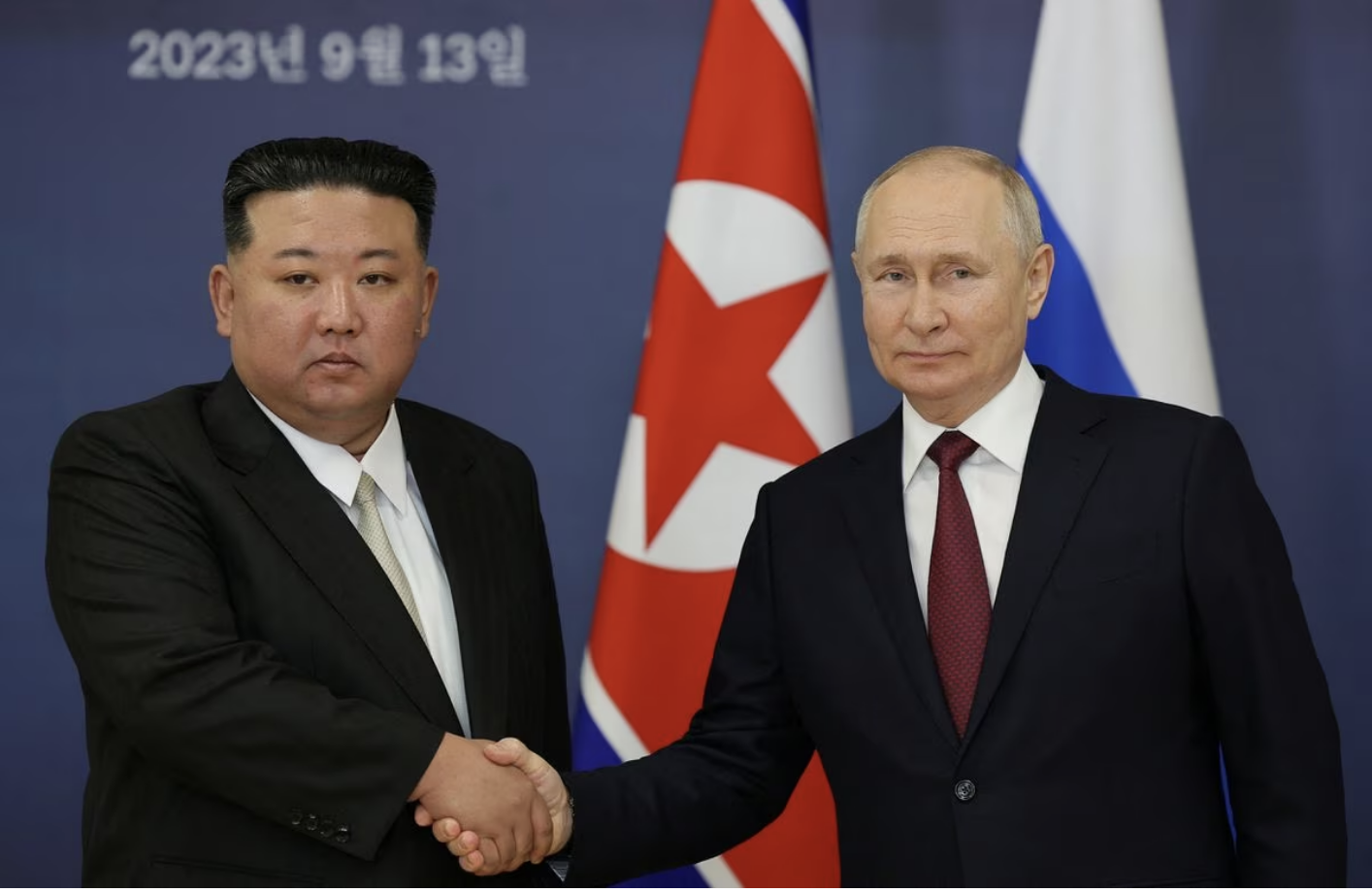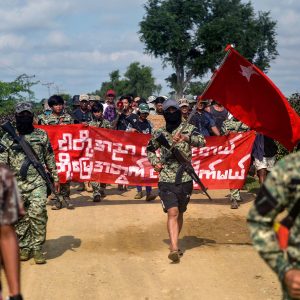70 years after South Korea and North Korea called a ceasefire on their ongoing armed conflict, tensions have run high between the two countries, but not culminating in mass violence. Their diplomatic relations continue to remain frosty, and their differences have diverged further through their respective alliances with the United States and Russia. Given the parallel tensions between the U.S. and Russia, it appears that the Koreas are simulating a proxy war that recalls the Korean War of an earlier era, with U.S.-backed South Korea facing off against the Russia-supported North.
While this pairing of geopolitical allies has existed since 1953, the dynamic has been drastically shifted by the Russia-Ukraine conflict. In February of 2022, Russia launched its brutal, unprovoked, and illegal invasion of Ukraine. While the war has invoked a wide range of foreign government intervention in the form of sanctions and military support, the United States led the charge, capitalizing on what it perceived to be an opportunity to down an international political rival and defend “democracy, human rights, and governance assistance” abroad, in the words of the U.S. Agency for International Development.
In accordance with this goal, the United States has granted over 70 billion U.S. dollars in aid since the conflict was instigated. Yet as the war of attrition begins to whittle down supplies for both sides of the conflict, the United States and Russia have called for reinforcements from the very countries they aided more than half a century ago. Despite the ceasefire agreement between North and South Korea, both sides have continued military personnel development through mandatory service for male citizens and stockpiling of military technology. Although South Korea has publicly insisted on its direct neutrality in the Russia-Ukraine conflict, the New York Times reports that the country has been discreetly shipping “hundreds of thousands of artillery shells” to the U.S. military to meet the demands of the Ukraine war.
The surreptitious nature of this transaction follows threats that Russian President Putin made to South Korea over the thorny topic of potential military assistance to Ukraine. However, North Korean Supreme Leader Kim Jung Un and Putin’s summit last month in Russia to consider an arms deal may cause South Korea to retaliate in a more globally conspicuous manner.
If nothing else, the Russia-North Korea summit provided an opportunity for Putin to project an image of strength to the Western world amid the embarrassment the war in Ukraine has become. Putin has seen his international reputation dwindle after his major miscalculation of the resilience of the Ukrainian military and citizenry, which has foreclosed any easy Russian victory. As U.C. Berkeley Political Science Professor Michael Fish, an expert in Russian politics, observed in an interview with the Berkeley Political Review, “Putin spearheaded the global anti-democratic movement, and became a geopolitical superstar.” Now, by contrast, Putin is “forced to stay away from international summits, such as the G-20 meeting in India, due to an arrest warrant for war crimes issued by the International Criminal Court.” A meeting with Kim gives Putin the chance to further stoke fears of escalation in the West and display his power to Russians back home.
Putin also faced a serious challenge to his regime this summer, when Yevgeny Prigozhin, the leader of Wagner Paramilitary Group, marched to within 150 miles of Moscow. Indeed, Fish contends the Prigozhin affair “was the most serious challenge to Putin’s rule yet.” Putin cut a deal with Prigozhin to stand down, only for an abrupt plane crash to kill the infamous regime critic weeks later. While the exact causes behind the event, which killed all 10 people on board the plane, remain unclear, the White House has suggested that Putin was responsible, and the Kremlin has a long history of silencing opponents. Hence, Putin was able to reassert his dominance in the wake of the Wagner mutiny, but his control over domestic affairs is tenuous.
Putin’s slippery grip on power has far-reaching implications for its eastern ally, North Korea. As objectively one of the two most powerful allies that North Korea maintains, Russia’s domestic troubles could spell trouble for Kim Jong Un’s staunch resistance against South Korean efforts to initiate diplomacy and kindle reunification talks. North Korea’s pro-military, fearmongering attitude toward global political intervention has heavily relied on steady supply intake and publicized messages of camaraderie from Russia and China. With much of its support base embroiled in political turmoil with Ukraine, North Korea may follow one of two paths on the extremities of the political spectrum. First, Kim’s regime could double down on its threat-based, militaristic approach to diplomacy, thus continuing their exchange of arms and cycle of mutual support. Under this paradigm, the two Korea’s chances of reunification grow even slimmer, with the South having no leverage over proposed benefits with the prospect of unification that Russia has not already offered. On the comparative, North Korea’s lack of long-term sustainability for military support may compel them to concede ground in their negotiations with their southern counterpart. With North Korea’s supplies not particularly in a surplus, its unreciprocated exchange of weapons emerging from Putin’s resource constraints amid the Ukraine war strips them of significant negotiating power when addressing South Korea.
Despite these two theoretically possible outcomes, the potential for North Korea’s backtracking on a tradition of military hostility towards South Korea built through generations of iron-fist leadership is nearly non-existent. North Korea will likely continue to back its Russian allies by supplying them with military support, as in the long run the benefits of their partnership transcend the relatively “short-term” conflict with Ukraine. Kim likely acknowledges the indispensable nature of Russia’s support in his aspirations to develop his military and build global political “fiat.” Meanwhile, as South Korea remains a stalwart partner of the United States, with no signs of decline in the military aid aspect of their mutualism, the two Koreas will continue to grow apart and, by extension, their hopes of reunification.
While the ceasefire is still in place upholding the facade of peace the two countries have managed to contrive, antipathy still simmers. Even absent direct interaction between the two Koreas, diverging loyalties in the global sphere reveal their relationship to be anything but indifferent.
Featured Image Source: Reuters






Comments are closed.